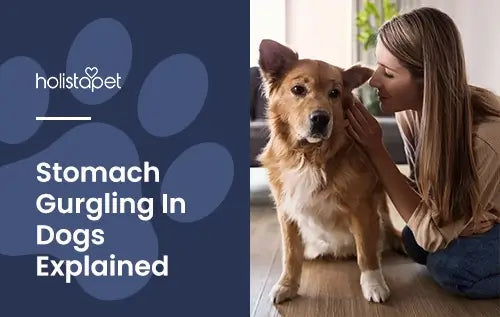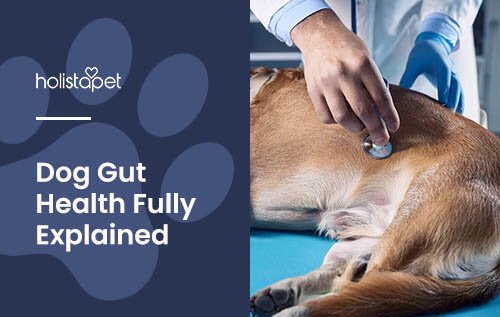Ever wondered, "Why is my dog's stomach gurgling?" Those strange sounds can catch any dog owner off guard. The good news is that they're usually nothing to worry about.
Your dog's stomach makes gurgling noises as a normal part of digestion. In some cases, though, loud stomach noises could be problematic, especially when accompanied by other symptoms.
Understanding the difference between your pup's normal and abnormal stomach noises is important. In this guide, we'll tell you what happens inside your dog's tummy and how you can ensure everything in there's working properly.
What Causes a Dog's Stomach To Make Noises?

A dog's stomach can make noises for several reasons. These sounds are often caused by food or gas moving through the gastrointestinal tract (GI tract) and are generally harmless. But sometimes, they can point to serious issues. Let's discuss the most common causes of dog stomach noises in more detail.
Normal Digestive Sounds in Dogs
A dog's stomach making noises is also called borborygmi. This happens as food, fluids, and gas move through the intestinal tract. You may notice this when your dog eats or prepares for their next meal. Unless your pup is making excessively loud stomach noises or showing signs like vomiting or diarrhea, there's usually no need to worry.
Gas and Bowel Movements
Stomach gurgling may happen as food and gas move through the digestive tract. This is especially true after your pup eats foods that produce more gas or if they swallow air while eating. These noises are usually harmless unless there are other red flags like bloating or discomfort.
Hunger and Empty Stomach Noises
When your dog is hungry, their stomach and intestines will try to push any remaining food or gas through the GI tract. This process, called peristalsis, is normal and can cause the tummy to produce loud noises. These sounds usually stop once your dog eats or drinks. In case the gurgling continues with other issues, like a decreased appetite or vomiting, consult your veterinarian.
When Should You Be Concerned About Your Dog's Stomach Noises?
Sometimes, your pet's stomach noises may need more attention. If you notice any of these signs, seek veterinary care immediately:
- Excessive Gurgling: What It Could Mean. Loud, continuous gurgling could suggest digestive issues or even bowel obstruction.
- Associated Symptoms To Watch For. Other clinical signs, such as vomiting, diarrhea, upset stomach, lethargy, constipation, decreased appetite, and distress, can point to bigger problems.
- Signs of Digestive Issues in Dogs. Persistent stomach noises combined with abnormal bowel movements or changes in behavior may indicate problems with your dog's digestive system.
Common Reasons for Stomach Gurgling in Dogs

Dog stomach gurgling can happen for several reasons. It's important to be aware of the most common triggers, such as dietary issues, eating too quickly, and swallowing air. We'll discuss these in more detail in the next sections.
Dietary Issues and Food Intolerance
Food allergies or intolerances can cause gas and noisy digestion. Loud noises can occur as the body tries to process ingredients that don't agree with it. If your dog ate their meal and started making loud noises, a specific ingredient in their food may be the issue. Try switching to a bland diet or foods made for sensitive stomachs.
Eating Too Quickly
When dogs eat or drink too quickly, they can swallow a lot of air. The swallowed air can create gas in the digestive tract, producing gurgling noises. Try feeding your dog smaller meals more frequently. A slow-feeder bowl may help, too.
Swallowed Air and Bloating
Swallowed air can get trapped in the digestive system, causing a buildup that may produce loud stomach noises. In some cases, this can lead to serious issues like gastric torsion, also known as bloat or Gastric Dilatation-Volvulus. Here, the stomach twists, trapping gas and food inside. This can cut off blood flow and become life-threatening. To prevent this, make sure your dog slows down while they eat and drink.
Related Post: Dog Bloated Stomach Home Remedies
Potential Health Problems Related to Stomach Gurgling
Potential health problems can make stomach gurgling more concerning. Issues such as gastrointestinal disorders, parasites, infections, or inflammatory bowel disease (IBD) may be the culprits. Let's take a closer look at each one in the next sections.
Gastrointestinal Disorders in Dogs
When dogs eat things they're not supposed to, like toys or bones, gastrointestinal obstruction can happen and cause severe gurgling sounds. More serious symptoms, such as vomiting, diarrhea, and stomach upset, may also show up.
Other disorders, such as chronic gastritis or irritable bowel syndrome, can also trigger loud stomach noises. If your pup's tummy gurgling persists and comes with other clinical signs, seek veterinary attention immediately.
Parasites or Infections
Intestinal parasites like roundworms, hookworms, or giardia can invade your dog's digestive tract. This can cause discomfort, increased stomach noises, and other symptoms like diarrhea, vomiting, or weight loss.
Bacterial infections can also irritate the gastrointestinal system and cause gurgling sounds and other signs of digestive distress. If your dog has had contact with contaminated water, food, or other infected animals, seek veterinary care to prevent the problem from worsening.
Inflammatory Bowel Disease
IBD is a chronic condition caused by irritation of the lining of the intestines. This makes it harder for the body to absorb nutrients. Common symptoms include tummy gurgling, diarrhea, weight loss, and occasional vomiting.
Changing a dog's diet and taking vet-prescribed medication can help manage IBD. It's always best to speak to your veterinarian if you suspect this issue.
How To Help Your Dog if Their Stomach Is Gurgling
You can take steps to help ease your dog's stomach gurgling. Many times, a simple dietary change can solve the issue. Other times, you may need the help of wellness products. In the following sections, we'll tackle specific ways you can help manage and prevent loud stomach noises in your furry friend.
Dietary Adjustments To Reduce Noises
Switching to a bland diet, especially for dogs with sensitive tummies, can help prevent digestive issues. Foods like boiled chicken, rice, and plain pumpkin can be easy on the stomach and help reduce gurgling.
Also, feeding your pup smaller, more frequent meals may prevent gas buildup and reduce the chance of gurgling. Lastly, ensuring your dog's diet is free from allergens can help maintain a quiet and healthy tummy.
Digestive Support Supplements and Dog Probiotics
Tummy-friendly pet wellness products may help reduce stomach noises in dogs. Probiotics, for example, can be helpful for pets prone to stomach upset or who have had recent dietary changes.
Our Probiotic Soft Treats for Dogs are a great option. These yummy chews can help balance the good bacteria in your dog's digestive system and promote a calmer tummy. Our chews contain a proprietary blend of 9 beneficial bacteria — a total of 3 billion CFU — that support smoother digestion.
View All Holistapet Dog Supplements
When To Visit the Vet for Stomach Noises

While stomach noises are usually normal, there are times when you should seek veterinary care. Consult your vet immediately if you notice any of the following:
- Ongoing Gurgling Sounds With No Improvement
- Accompanying Symptoms Like Vomiting, Diarrhea, Constipation, or Reduced Appetite
- Signs of Discomfort or Bloating
- Sudden Changes in Your Dog's Behavior or Energy Levels
Final Thoughts on Why Your Dog's Stomach Is Making Noises
Occasional stomach noises in your furry friend are usually nothing to worry about. These sounds are often part of the normal digestive process. But if you notice loud or persistent gurgling accompanied by other unpleasant symptoms, go see your vet.
Caring for your dog's digestive health adds to their overall health and well-being. By making dietary changes and adding probiotics like those from HolistaPet, you can help keep your pup's tummy happy and healthy.


 CBD Oil for Dogs - Fast Acting
CBD Oil for Dogs - Fast Acting
 Chicken Flavored CBD Oil For Dogs - Easy Dose
Chicken Flavored CBD Oil For Dogs - Easy Dose
 Salmon Flavored CBD Oil For Dogs - Highly Rated
Salmon Flavored CBD Oil For Dogs - Highly Rated
 CBG Oil for Dogs and Cats - Loved by Thousands
CBG Oil for Dogs and Cats - Loved by Thousands





Leave a comment
All comments are moderated before being published.
This site is protected by hCaptcha and the hCaptcha Privacy Policy and Terms of Service apply.